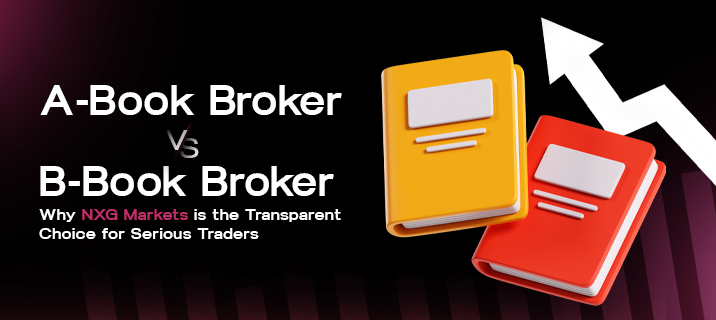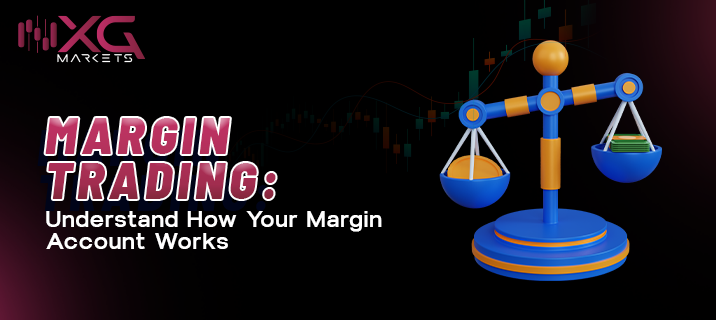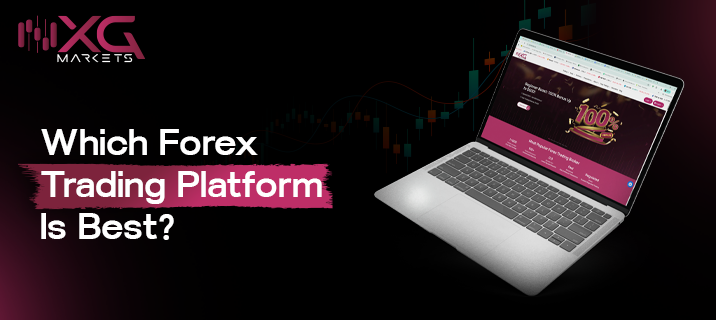
A-Book Broker vs B-Book Broker: Why NXG Markets is the Transparent Choice for Serious Traders
Jun 09, 2025 12:00 amWhen selecting a Forex broker, it's essential to understand the difference between A-Book and B-Book models. These execution types directly affect how trades are processed, the transparency of pricing, and the level of risk that traders encounter. Whether you are an experienced investor or new to Forex trading, understanding these distinctions can help you explore the market more effectively.
This article will explore the A-Book vs B-Book broker models, discussing their advantages, drawbacks, and how NXG Markets provides a reliable trading solution.
What is an A-Book Broker?
An A-Book Broker uses automatic processing to send your trades right to the liquidity providers without broker intervention.
Key Characteristics of A-Book Brokers:
- No dealing desk execution – Traders interact directly with the real market.
- Market-driven pricing – Orders are filled at actual market rates without artificial manipulation.
- Lower conflict of interest – Brokers earn commissions rather than profiting from traders’ losses.
This model is favoured by professional traders who seek a transparent trading environment, real-market liquidity, and minimal broker interference.
What is a B-Book Broker?
A B-Book Broker, often referred to as a Market Maker, operates differently from STP brokers. Instead of routing trades to external liquidity providers, they manage orders internally, acting as counterparties to their clients’ positions.
Key Characteristics of B-Book Brokers:
- Dealing desk execution – The broker processes trades within its system rather than passing them to external providers.
- Fixed spreads – Fixed spreads mean the price difference stays the same, so you know exactly how much trading will cost.
- Potential conflict of interest – Since the broker profits from traders’ losses, concerns about fair execution may arise.
Differences Between A-Book and B-Book Brokers
Several factors set A-Book brokers apart from B-Book brokers:
- Execution Model: A-Book brokers use STP execution, sending orders directly to liquidity providers, whereas B-Book brokers process orders internally.
- Order Routing: A-Book brokers provide access to real market prices, while B-Book brokers control pricing within their own trading book.
- Conflict of Interest: A-Book brokers remain neutral, while B-Book brokers may have an incentive for traders to lose, as they profit from client losses.
- Speed and Accessibility: B-Book brokers often provide instant execution with fixed spreads, which can be advantageous for beginner traders, while A-Book brokers rely on market liquidity, sometimes leading to slippage.
- Suitability for Traders: A-Book brokers are typically ideal for advanced traders who prefer transparency, while retail traders may find B-Book brokers more accessible due to fixed pricing and instant execution.
The best choice depends on how you trade, how much risk you're comfortable with, and what the market is like.
Which Broker Model is Right for You?
Before deciding between an A-Book or B-Book broker, traders should consider:
- Trading style: Are you looking for market-driven pricing or controlled execution with fixed spreads?
- Risk management: Do you prefer direct access to liquidity providers or simpler trading conditions?
- Market volatility: During high volatility, A-Book execution may lead to slippage, while B-Book brokers ensure consistent pricing.
Understanding these factors will help you align your trading approach with the broker model that best suits your needs.
Why Does the Broker Model Matter?
The choice between an A-Book and B-Book broker affects more than just your trading costs. It impacts trust, execution quality, and your overall trading experience.
- Trust and Transparency: A-Book brokers have no reason to trade against you, which builds trust. B-Book brokers, if not transparent, may have conflicting interests. That’s why regulation and clear communication are so important.
- Execution Quality: A-Book brokers offer genuine market execution, which means your trades are less likely to be manipulated. B-Book brokers can sometimes offer faster execution, but you need to ensure the broker is reputable.
- Trading Costs: Both models can offer competitive spreads, but the source of those spreads and the broker’s motivation differ. Check the broker's fee carefully and ask them if you have any questions.
Why NXG Markets is the A-Book Broker of Choice
Choosing NXG Markets means choosing integrity, efficiency, and trader-focused execution. With a robust A-Book infrastructure, NXG Markets provides access to real liquidity, fast order execution, and a platform built around trust.
Why Traders Trust NXG Markets:
- STP Model (A-Book): Orders go straight to liquidity providers.
- Regulated Trading Environment: Operating under strict compliance.
- Advanced Infrastructure: Ultra-low latency for real-time execution.
- No Conflict of Interest: NXG profits from commissions, not losses.
- Client-Centric Support: Dedicated service and education tools.
Whether you’re scalping, swing trading, or deploying automated systems, NXG’s A-Book model gives you a competitive edge.
Frequently Asked Questions about A-Book Brokers and NXG Markets
Q: Is NXG Markets a true A-Book broker?
Yes. NXG Markets operates with a transparent STP model, sending your trades directly to top-tier liquidity providers without internal dealing desks.
Q: Can NXG switch between models?
NXG primarily uses the A-Book model but offers flexible solutions for different trading needs, including hybrid executions where required, always with full transparency.
Q: Why is A-Book execution better for trust?
The business model of A-Book brokers means your losses don't translate into their profits. NXG’s business model aligns with your success, not against it.
Q: What makes NXG Markets stand out from other brokers?
NXG combines real-market pricing, compliance, fast execution, and trader-first policies in a powerful A-Book package.
Why Online Reputation Matters for Brokers
In today’s digital age, a broker’s online reputation is as important as its trading conditions. At NXG Markets, we invest in both SEO and Online Reputation Management (ORM) to ensure traders find accurate, helpful information about our services. By providing reliable content and maintaining transparency, we build trust and long-term relationships with our clients.
Conclusion:
Understanding the differences between A-Book and B-Book brokers helps traders make informed decisions that align with their goals. Whether you prioritise market transparency or predictable execution, selecting the right broker can significantly impact your trading success.
Ready to trade smarter? Visit NXG Markets today and explore the trading model that works best for you.


.png)




